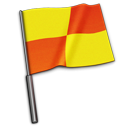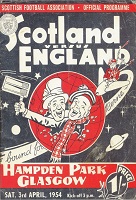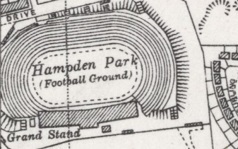 flg.jpg) "FINNEY
THE MAGICIAN"
Sunday Mirror "FINNEY
THE MAGICIAN"
Sunday Mirror |
  Officials
from Northern Ireland Officials
from Northern Ireland |
Scotland |
UK ruling on substitutes |
England |
Referee
(red)
Thomas James
Mitchell
42 (28 January 1912), Lurgan, Ulster |
Teams introduced to the Guest of Honour, The Right Honourable James Stuart MVO, MC, MP, Secretary of State for Scotland, as well as The Lord Provost, Sir Amos Hirst, Harry Swan and Sir George Graham.
The National Anthem was sung by Robert Wilson
|
|
Linesmen |
W. Williams
Belfast |
V. Maxwell
Belfast. |
|
|
|
 Scotland
Team Scotland
Team |
| |
|
Rank |
No official ranking system established;
ELO rating 10th |
Colours |
Made by Umbro - blue jerseys with white collars,
white shorts, blue socks with red tops. |
|
Captain |
Sammy Cox |
Official in charge: |
Andrew Beattie (40, 11 August 1913) for
the upcoming World Cup Finals, current Huddersfield Town AFC
manager. |
|
Trainer: Alec Dowdell (The Celtic FC) |
First match, W 0 - D 0 - L 1 - F 2 - A 4. |
|
The Scottish Football Association
Selection Committee, on Wednesday, 24 March
1954 |
 Scotland
Lineup Scotland
Lineup |
|
|
Farm, George N. |
29
264 days |
13 July 1924 |
G |
Blackpool FC, England |
7 |
14ᵍᵃ |
|
691 |
2 |
Haughney, Michael |
27
114 days |
10 December 1926 |
RB |
The Celtic FC |
1 |
0 |
|
only app
1954 |
|
3 |
Cox, Samuel R. |
29
355 days |
13 April 1924 |
LB |
Rangers FC |
24 |
0 |
|
final app
1948-54 |
|
4 |
Evans, Robert |
26
262 days |
16 July 1927 |
RHB |
The Celtic FC |
15 |
0 |
|
5 |
Brennan, Frank |
29
345 days |
23 April 1924 |
CHB |
Newcastle United FC, England |
7 |
0 |
|
final app
1946-54 |
|
6 |
Aitken, George G.M. |
28
310 days |
28 May 1925 |
LHB |
Sunderland AFC, England |
8 |
0 |
|
final app
1949-54 |
7
 |
Mackenzie, John A. |
28
211 days |
4 September 1925 |
OR |
Partick Thistle FC |
2 |
0 |
|
8 |
Johnstone, Robert |
24
208 days |
7 September 1929 |
IR |
Hibernian FC |
9 |
5 |
|
9 |
Henderson, John G. |
22
76 days |
17 January 1932 |
CF |
Portsmouth FC, England |
3 |
1 |
10
 |
Brown, Allan D. |
27
173 days |
12 October 1926 |
IL |
Blackpool FC, England |
9 |
6 |
|
692 |
11
 |
Ormond, William E. |
27
39 days |
23 February 1927 |
OL |
Hibernian FC |
1 |
1 |
|
reserves: |
Travelling reserve is Willie Fernie (The Celtic FC).
Full team of reserves are
John Anderson (Leicester City FC); Jock Aird (Burnley FC); Tommy Docherty (Preston North End FC),
Frank Brennan (Newcastle United FC) and Doug Cowie (Dundee FC); Tommy
Wright (Sunderland AFC) and Willie Fernie (The Celtic FC); Willie Bauld (Hearts of
Midlothian FC), Willie Fernie and Billy Liddell (Liverpool FC). |
|
team changes: |
Frank Brennan replaced Rangers FC's Willie Woodburn at centre-half on
31 March. After three days of discussion, his club withdrew him
because of injury concerns. |
|
|
|
2-3-5 |
Farm
-
Haughney, Cox -
Evans, Brennan, Aitken -
Mackenzie,
Johnstone, Henderson, Brown, Ormond. |
|
Averages: |
Age |
27 years 183
days |
Appearances/Goals |
7.8 |
1.0 |
|
|
|
flg.jpg) England
Team England
Team |
| |
|
Rank |
No official ranking system established;
ELO rating 4th |
Colours |
The 1949 home
uniform -
White collared jerseys, blue shorts, red socks.
|
|
P 37th of 43, W 21 - D 9 - L 7 - F 101 - A 58. |
|
Captain |
Billy Wright
|
Manager |
Walter Winterbottom, 41 (31 March 1913), appointed as FA national director of coaching/team manager on 8 July 1946; |
|
record 41st of 90, W 25 - D 8 - L 8 - F 104 - A 58. |
Trainer: Jimmy Trotter (Charlton Athletic FC) |
P 59th of 139, W 38 - D 12 - L 9 - F 178 - A 79,
inc. one abandoned. |
|
|
 ³ ³ |
Team chosen by Selection Committee, headed by
Harold Shentall, on Monday, 29 March. |
flg.jpg) England
Lineup England
Lineup |
|
|
record post-war
eight
changes
to the previous match
(Merrick, Wright & Dickinson remain) |
league position
(29 March) |
|
|
|
Merrick, Gilbert H. |
32
67 days |
26 January 1922 |
G |
Birmingham City FC
(FL2 5th) |
18 |
29ᵍᵃ |
|
first to 29ᵍᵃ |
|
727 |
2 |
Staniforth, Ronald |
29
355 days |
13 April 1924 |
RB |
Huddersfield Town AFC
(FL 3rd) |
1 |
0 |
|
the 18th Town player to represent
England |
|
728 |
3 |
Byrne, Roger W. |
24
207 days |
8 September 1929 |
LB |
Manchester United FC
(FL 6th) |
1 |
0 |
|
the 14th United player to represent
England |
|
4 |
Wright, William A. |
30
56 days |
6 February 1924 |
RHB |
Wolverhampton Wanderers FC
(FL 2nd) |
56 |
3 |
|
most apps
1952-54 |
|
729 |
5 |
Clarke, Henry A. |
31
39 days |
23 February 1923 |
CHB |
Tottenham Hotspur FC
(FL 14th) |
1 |
0 |
|
the 23rd Hotspur player to represent
England |
only app
1954 |
|
6 |
Dickinson, James
W. |
28
344 days |
24 April 1925 |
LHB |
Portsmouth
FC
(FL 13th) |
33 |
0 |
7
   |
Finney,
Thomas |
31
363 days |
5 April 1922 |
OR |
Preston
North End FC
(FL 12th) |
49 |
23 |
8
 |
Broadis, Ivan A. |
31
106 days |
18 December 1922 |
IR |
Newcastle United FC
(FL 17th) |
9 |
5 |
|
the 17th United player to represent
England |
9
 |
Allen, Ronald |
25
78 days |
15 January 1929 |
OR |
West Bromwich Albion FC
(FL TOP) |
2 |
1 |
|
730 |
10 |
Nicholls, John |
23 |
3 April 1931 |
IL |
West Bromwich Albion FC
(FL TOP) |
1 |
1 |
|
the 29th Albion player to represent
England |
11
  |
Mullen, James |
31
87 days |
6 January 1923 |
OL |
Wolverhampton Wanderers FC
(FL 2nd) |
10 |
5 |
|
reserve: |
Ken Armstrong (Chelsea FC
(FL 7th)) |
|
team notes: |
Johnny Nicholls
becomes the
135th England player to score on his debut, only the
second to do so in a World Cup match.
Ken Armstrong is the 95th
different player chosen by Winterbottom to make the teamsheet.
Ronnie Allen is the 75th different England player to have
scored against Scotland. |
|
records: |
For
the second time, England have conceded fourteen goals in a single
season. |
|
|
|
2-3-5 |
Merrick -
Staniforth, Byrne -
Wright, Clarke, Dickinson
-
Finney, Broadis, Allen, Nicholls, Mullen. |
|
Averages: |
Age |
29
years 356 days |
Appearances/Goals |
16.5 |
3.1 |
|
England teams v. Scotland: |
|
1953: |
Merrick |
Ramsey |
Smith |
Wright |
Barrass |
Dickinson |
Finney |
Broadis |
Lofthouse |
R.Froggatt |
J.Froggatt |
|
1954: |
Merrick |
Staniforth |
Byrne |
Wright |
Clarke |
Dickinson |
Finney |
Broadis |
Allen |
Nicholls |
Mullen |
|
|
|
|
Match Report by
Mike Payne |
|
 Once
again the incredible sequence of results between these countries continued
with England winning at Hampden. With Scotland's record at Wembley almost
as good as England's was in Glasgow, perhaps there was a case for the two
sides swapping grounds! Once
again the incredible sequence of results between these countries continued
with England winning at Hampden. With Scotland's record at Wembley almost
as good as England's was in Glasgow, perhaps there was a case for the two
sides swapping grounds!
"Negotiations
between the Scottish Football Association and the British Broadcasting
Corporation have taken place, as the result
of which the association are unable to grant permission to the B.B.C. for
the live broadcasting in their Television Service of any part of the
Scotland v. England International, to be played at Hampden Park on April
3, because other matches are being played in Scotland on that day. The
association were prepared to grant facilities for a tele-recording of the
International for transmission on Monday, April 5, but this alternative
was not acceptable to the B.B.C. The 'highlights' of the match will.
however, be covered in Television 'Newsreel' on Monday evening, April 5."
|
- Tuesday, 23 March 1954, Glasgow Herald. |
|
.jpg) |
England, still
reeling from the devastating defeat at the hands of Hungary at Wembley the
previous November, made eight changes for this game. Four new caps were
brought in and there were other changes, too. There was an awful lot at
stake at the winners of this match gained automatic entry into the 1954
World Cup finals to be held in Switzerland.
The big
difference between the sides on this day was in the taking of chances. In
this department England gave Scotland a lesson.
A massive crowd of
over 134,000 people roared Scotland on in the early stages and the England
defenders clung on desperately as chance after chance went begging for the
Scots. After three minutes Gil Merrick made a superb save from a
point-blank shot by Johnstone. Then Jimmy Dickinson was very relieved to
see his attempted clearance slice just wide of his own goal.
Shortly afterwards, Brown missed a golden opportunity, shooting tamely at
Merrick after breaking clear of the England defence. The pressure
eventually told, though, and after seven minutes Scotland took the lead.
McKenzie sent over a corner which found Brown and, with the aid of a
deflection off Ron Staniforth, his shot found the net. The crowd went wild
and were baying for the heads of the Auld Enemy. But amongst the new faces
in the England side there was also the experience of Billy Wright and
Dickinson. Between them they cooly went about steadying the ship.
They were given a boost in the 15th minute when England equalised, and a
real gem it was too. Staniforth found Wright with a good pass. The captain
moved the ball on to Tom Finney, who was beginning to get the better of
Cox. The Preston player sent an inch-perfect pass forward right into the
stride of Ivor Broadis. The inside-forward drew Farm from goal before
firing a good shot wide of the goalkeeper.
For the remainder of the
half Scotland had the better of things but continued to miss chances. They
were missing the lively Reilly up front and failed to exploit Harry
Clarke's obvious weaknesses to the full. The fact that the scores were
still level at the break flattered England somewhat but after half-time
the visitors made Scotland pay for their lack of finishing.
Five
minutes after the restart England gained the lead they were not to lose.
Again Finney was the star of the move. Wright again found the winger with
his pass from defence and Finney set off on a mazy dribble that left Cox
chasing shadows. When the cross came over Johnny Nicholls dived full
length to head home.
Cox was now being given the runaround and the
link up that Finney had with Broadis was beginning to dominate. Ronnie
Allen too, looked very good with his deep-lying role and sharp pace.
Nicholls though was not as promising despite his goal. His missed two good
chances before England increased their lead in the 70th minute. This time
a deep free-kick by Jimmy Mullen was fiercely headed in by Allen. Near the
end England wrapped up the result with a goal which typified the way
the game had gone.
Scotland, once again, were pressing hard. A
corner from the right was cleared by Nicholls to Finney, who set off on
another superb run. Poor Cox was sent in many different directions before
Finney crossed for Mullen to head number four. Scotland, bewildered but
battling to the end, did score again in the dying seconds. A swirling
cross by Ormond completely deceived both Merrick and Roger Byrne on the
goal-line to drop into the net.
So, a win for England and although
the game was never a classic, it had many memorable moments.
|
|
Match Report by
Norman Giller |
|
The
England selectors made eight changes to the team taken apart by Hungary.
Johnny Nicholls had good reason to remember his debut. It was his 23rd
birthday and he celebrated with England's second goal, a flying header
from a Tom Finney cross. Playing alongside his West Bromwich Albion
team-mate Ronnie Allen, he was one of four debutants, along with Ron
Staniforth, Harry Clarke and Manchester United left-back Roger Byrne, who
was to prove himself one of the finest players ever to wear the No 3
shirt. Clarke, 31-year-old centre-half, followed Ditchburn, Ramsey,
Willis, Nicholson and Medley as members of the Spurs 'push-and-run' team
who were capped after the age of thirty-plus. Roared on by a vast crowd of
134,554, Scotland took the lead in the seventh minute through Blackpool's
Allan Brown. Ivor Broadis equalised eight minutes later after penetrating
approach work by Wright and Finney. It was the same combination of Wright
and Finney that set up England's second goal by birthday boy Nicholls five
minutes into the second half. Headed goals by Allen and Jimmy Mullen
wrapped the game up for England and guaranteed them going to the World Cup
finals as Home Champions. Scotland scored a strange second goal in the
last minute when a cross from Willie Ormond suddenly swirled into the net.
|
|
Match Report
as appears in the F.A. Yearbook 1954-55, page 28 |
|
Only
three of the players against Hungary retained their places for the match
at Hampden Park, and the team included four new caps. Rain driven by a
strong wind made conditions difficult and the pitch treacherous, and
Scotland began with a series of penetrating attacks, Brown scoring the
first goal in the 7th minute after a corner-kick by McKenzie. At first
England did not look like settling down until a fine goal came from
Broadis following classic passes between Staniforth, Wright, and Finney.
Two misses by Nicholls came next and a low header into the net by Allen
which was disallowed as being offside.
With scores still level at the
interval, Finney made a brilliant move past Cox and passed to Nicholls
whose header put England one up. England's third goal came off Allen's
head after a deep free-kick by Mullen. The dominant feature in the English
attack was the right wing combination of Broadis and Finney, the latter
making a lengthy run completed by a fine centre from which Mullen scored
England's fourth goal. Shortly before the final whistle Ormond gave
Scotland a second goal, but by then it was no more than a consolation
prize.
|
In
Other News....
|
It was on 2 April 1954 that a Liverpool judge, on convicting
four members of a teenage gang to two years each in prison
for wounding with intent to cause grievous bodily harm, with
a broken bottle, questioned the police inspector whether
this sort of violence was becoming commonplace in the young.
The Edwardian-style suits that had become popular within
teenage gangs across the country had earned them the
nickname 'Teddy Boys'. |
|
|
|
|
|
|
Source Notes |
TheFA.com
Original newspaper reports
Official matchday programme
LondonHearts.com |
|
Rothman's Yearbooks
Mike Payne's England: The Complete Post-War Record
Norman Giller, Football Author
The Complete Book of the British Charts
British Pathé |
|
|
cg |

